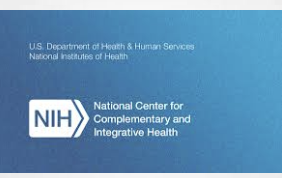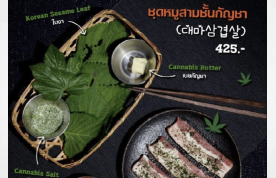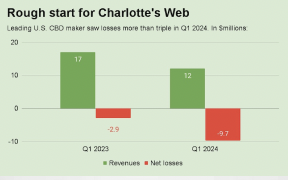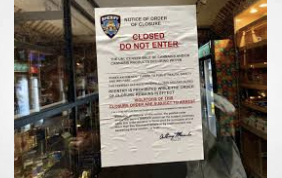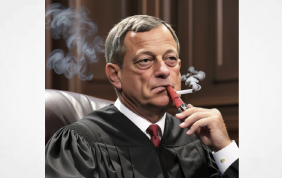Denver Archbishop Samuel J. Aquila released a pastoral letter this week citing Church doctrine to caution against the “broad acceptance” of recreational marijuana.
“I write to you out of pastoral concern for the salvation of souls, and I am convinced of the need to address the impact … marijuana use is having on individuals, families, and society in general,” Aquila wrote in the introduction of his 60-page letter.
Stop the Backdoor Legalization of Marijuana
“With each passing day, we are confronted with the challenges of the broad acceptance of recreational marijuana, both politically and culturally, in Colorado and beyond,” the archdiocese’s Office of Marketing and Communications stated in a press release.
In 2012, Colorado became the first state to legalize recreational marijuana. Twenty-three other states have followed, with Ohio becoming the most recent following a Tuesday referendum.
The city of Denver is widely known for being especially friendly to users of the drug. The well-known travel guide company Lonely Planet has even published an online guide promoting so-called “cannabis tourism” in the city.
The archdiocese criticized the common argument from pro-marijuana activists that the substance is “not addictive” compared to “harder” drugs.
Again from the press release:
Drug advocates draw a distinction between “hard” and “soft” drugs, arguing that the latter is permissible because the risks of bodily harm are minimal. While a “soft” drug like marijuana might not cause physical dependency, it can cause psychological dependency.
We have witnessed this phenomenon in Colorado, with marijuana use disorder affecting 1.6% of the population in the early 2000’s but jumping 3.3% as of 2019 – more than doubling in a span of less than twenty years.
Not only has the THC levels increased from 2% to at least 15%, making marijuana more potent, but the CDC warns “that people who use marijuana are more likely to develop temporary psychosis and long-lasting mental disorders, including schizophrenia.
“In Colorado, we are now a decade into this experiment,” Aquila wrote. “As more studies come out and more deaths from fentanyl pile up, we now have an overwhelming amount of data that reinforces what we have known to be true all along: the legalization of marijuana and cultural acceptance of drug use have been disastrous to our society.”
Stop the Backdoor Legalization of Marijuana
“Drugs diminish our self possession by harming the very faculties that make us human,” Aquila added:
Drugs inhibit our use of reason, weaken our will’s orientation toward the good, and train our emotions to expect quick relief from artificial pleasure. These effects severely limit our ability to freely give ourselves to another—whether it be temporarily, as in the case of occasional drug use, or regularly, as in the case of drug addiction. We say “no” to drugs so that we may fully say “yes” to our vocation to love.
Later, the archbishop cited Paragraph 2291 of the Catechism of the Catholic Church, which states:
The use of drugs inflicts very grave damage on human health and life. Their use, except on strictly therapeutic grounds, is a grave offense. Clandestine production of and trafficking in drugs are scandalous practices. They constitute direct co-operation in evil, since they encourage people to practices gravely contrary to the moral law.
“This truth is borne out in the lives of the 18.4 million Americans who are trapped in drug addiction (6.6% of the population age 12 and older). Pope Francis was right to call drugs ‘a new form of slavery,’” Aquila explained.
He also noted that the Catechism “insightfully” includes Paragraph 2291 in its section about the fifth commandment, “You shall not kill.”
In the “Frequently Asked Questions” section of his letter, Aquila highlighted a distinction between recreationally- and medicinally-consumed marijuana.
“As far as medical marijuana is genuinely effective, it should be treated like any other medication,” he wrote. “This means, first, that there should be limits on how much is consumed daily. Like any other medication, medical marijuana should be used with the intention of trying to restore health to the body.”
“While drug use can offer temporary relief and escape, it is certainly not a solution to our problems and the costs far outweigh the benefits,” he wrote in his conclusion. “Having experienced first-hand the societal consequences of legalizing marijuana, we must share the truth of what we have seen, heard, and lost.”
Stop the Backdoor Legalization of Marijuana
Aquila ended his letter with the following prayer:
I pray for those who turn to drugs to escape reality, to avoid pain, to deal with loneliness, rejection, emotional wounds, or to deal with the struggle to find meaning in life. I ask our Lord, Jesus Christ, to have mercy on them, to turn their hearts away from what is below them, to what only he can offer: true love, joy, peace, and happiness.
I pray for all those who have family members who are addicted to and suffering from drug use. I pray for their perseverance, courage, and wisdom. May the God who sent his only begotten Son out of love for humanity to give us abundant life open our hearts to the true gift of life.
